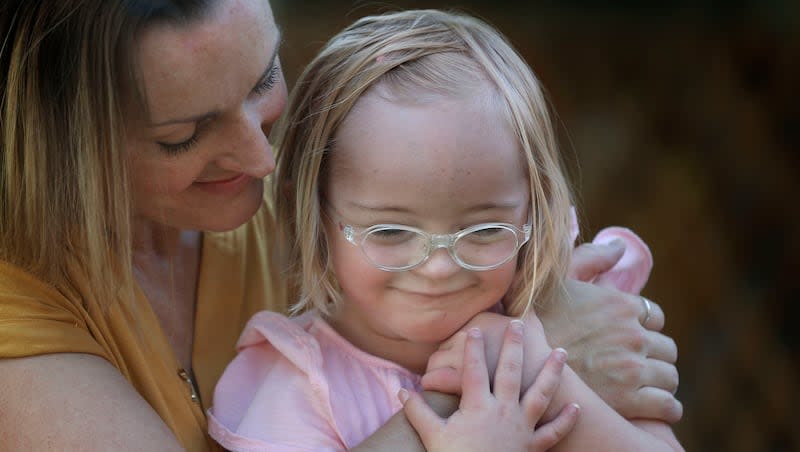World Down Syndrome Day: End the stereotypes

Thursday is World Down Syndrome Day, in recognition of three copies of chromosome 21. (Get it? 3/21 — clever.) The theme for this year is “End the Stereotypes.”
A new ad campaign with Small New York, in association with the National Down Syndrome Society, features actor and model Madison Tevlin, who speaks candidly about the ways she is often treated as a person with Down syndrome.
The ad ends with people with Down syndrome standing together as they look directly in the camera. The ad then calls the audience to action: “Assume that I can, so maybe I will.”
When the ad agency posted on Instagram, the caption read: “Our negative assumptions about people with Down syndrome can lead us to treat them in such a way that these assumptions become reality. In sociology, this is called a ‘self-fulfilling prophecy.’ Why not reverse our perspectives? If we have positive assumptions about people with Down syndrome, we’ll give them more opportunities in their schools, workplaces, relationships and activities. And maybe these positive assumptions will become reality.”
Each year in United States, between 5,100 and 6,000 babies are born with Down syndrome, making it the most common chromosomal conditioned diagnosed in this country. There is no known prevention for the occurrence of Down syndrome — but some countries are seeing a significant drop in the number of babies born with Down syndrome. One, Iceland, is claiming the near-eradication of Down syndrome. How is that possible?
Post-diagnosis abortion.
What a loss.
Thirty-three years ago, I was in Romania to adopt. We had three small children at home at the time, including one with some pretty severe disabilities. During my time in Romania, we were blessed to adopt a small girl with Down syndrome from a large orphanage. Alexandra was 18 months old when we adopted her and weighed 13 pounds — average for a 3-month old baby in the U.S.
She came with scars on her head that were never explained, but we wondered if they had tried experimental surgery. It’s certainly possible. After she had been in the U.S. for 3½ years, surgeons here found rotting gauze in her sinuses that had been there from before our adoption. It was as awful as you might imagine.
When Alexandra first came home and we tried to give her a bath, she would scream and try to crawl up our arms so she didn’t have to touch the water, clearly terrified of what “bath” used to mean. She had handprint impressions on her tiny little body where she had been hit so often.
When the adoption was complete and we applied for her visa, we found that she was prohibited from entering the country. At the time, the list of conditions banned by the Centers for Disease Control and Prevention included Down syndrome — as if it might be contagious. We had to obtain a special exemption by the CDC to allow her to immigrate.
With literally all children, every one is unique. Alexandra had Down syndrome, yes, but she also had attachment disorder and a deep fear of other people. She literally cried every time she was held for the first year and a half she was home — and she absolutely hated the camera. Family pictures from that era have four smiling children and one wailing one. Every. Single. Time.
She became happy but she first had to learn how to trust. She never did learn to walk but she did a funny snowplow stance with her head on the ground and bum in the air that got her around the house. She also was never able to talk verbally but she did learn a few words in sign language. More, milk, cracker, thank you, hungry. And most touchingly, “I love you.”
She loved to chew — on everything. Her crib had teeth marks, she chewed through the backs of board books and once, she got my ankle.
She was our first child to pass away, nearly 29 years ago, at age 5½. Her life — like all lives — had infinite value. We sometimes heard that she was lucky to be adopted by us. We always felt we were the lucky ones.
Robert Hensel, a disability activist, once said, “There is no greater disability in society than the inability to see a person as more.”
Amen. Let’s end the stereotypes.

